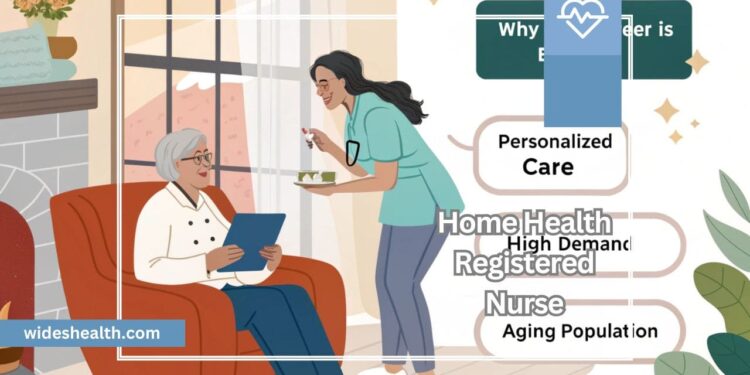The healthcare industry is rapidly evolving, and one of the most impactful roles emerging today is that of a home health registered nurse (RN). These dedicated professionals provide medical care directly in patients’ homes, offering personalized treatment for the elderly, chronically ill, and those recovering from surgeries or illnesses.
Unlike traditional hospital nursing, home health RNs work independently, managing patient care in a more intimate setting. This career path is not only rewarding but also in high demand due to an aging population and a growing preference for home-based care.
What is a Home Health Registered Nurse?
Before diving into my personal experiences, let’s define what a Home Health Registered Nurse does. Essentially, home health RNs are healthcare professionals who provide medical care to patients in their homes, rather than in a hospital or clinic. This type of care is usually for individuals who are recovering from an illness or surgery, those with chronic conditions, or elderly individuals who need assistance with their daily medical needs.
Home health nurses like me are responsible for tasks such as administering medications, monitoring vital signs, wound care, and educating patients and their families about managing health conditions. We work closely with doctors, physical therapists, and other healthcare providers to create a comprehensive care plan tailored to each patient.
My Journey into Home Health Nursing:
I’ve always had a passion for healthcare, but I didn’t originally plan on becoming a home health nurse. I started my career in a hospital setting, and while I loved the fast-paced environment, I always felt a pull towards something more personal and meaningful.
One day, after working a shift in the ICU, I realized that the most rewarding moments for me were when I had one-on-one interactions with patients—when I could truly connect with them and offer comfort in their time of need. That’s when I decided to transition into home health nursing.
The first few weeks of working as a home health RN were a mix of excitement and nervousness. I wasn’t sure how I would handle the responsibility of providing care in someone’s home, without the constant support of a hospital team. But soon, I realized that the personal connections I built with my patients were unlike anything I had experienced before.
The Rewards of Home Health Nursing:
One of the most rewarding parts of being a home health nurse is witnessing patients recover in their own homes. I remember Mrs. Thompson, an elderly woman recovering from hip surgery, who gradually regained her independence with my help. It was amazing to see her go from needing assistance to walking on her own.
Beyond physical healing, offering emotional support is equally fulfilling. Listening to patients, providing encouragement, and simply being there creates meaningful connections. The bond I form with my patients is truly special. These moments reaffirm why I chose this path—to help people regain their health and improve their quality of life.
Also read: Health Theevergreenessentials – Say Goodbye To Diet Struggles Forever!
Challenges of Being a Home Health Registered Nurse:
Unpredictability and Quick Decision-Making:
In home health nursing, each day is unpredictable. Unlike hospitals, where there’s a structured environment with a support team, I’m often the only healthcare professional present. This requires me to think quickly, adapt to different situations, and sometimes make decisions independently, without immediate backup or assistance from other professionals.
Environmental Factors:
Not every patient’s home is ideal for recovery. I’ve encountered homes that are cluttered, not wheelchair accessible, or lack the necessary care equipment. This can complicate procedures, and it’s up to me to creatively adjust the environment and ensure the patient’s safety, requiring extra effort and problem-solving to deliver proper care.
Emotional Toll:
Many of the patients I care for are elderly or suffering from chronic conditions. Watching them decline in health can be heartbreaking, especially when I form emotional bonds. It’s difficult when a patient I’ve grown close to passes away. However, these emotional challenges remind me of the impact of my work and deepen my compassion.
The Impact on Families:
Home health nursing has a significant impact on families. I often work with family caregivers who are dedicated but lack the medical training needed for proper care. I teach them essential skills like medication administration, wound care, and other aspects of their loved one’s health. There’s a special satisfaction in knowing that I’m not only helping the patient but also empowering their family to provide better care. Many family members express gratitude for the skills I’ve taught them, and it’s rewarding to know that my support positively affects the entire family, not just the patient.
Personal Reflection – Why I Love Being a Home Health Nurse!
Becoming a Home Health Registered Nurse has been one of the most rewarding choices of my life. It allows me to provide individualized care in the comfort of patients’ homes, while forming meaningful and trusting relationships.
Beyond physical recovery, I offer emotional support by listening to their concerns, providing guidance, and helping them navigate through challenges. This role has taught me valuable lessons in patience, empathy, and the profound impact of human connection. It’s not just about treating physical ailments; it’s about healing hearts and making a real, lasting difference in people’s lives.
Also read: Digestive Health Clinic Nampa – Expert Gi Specialists Near You!
What Does a Home Health Registered Nurse Do?
Home health RNs deliver skilled medical care patients in’ homes. They perform health evaluations, monitor conditions, and administer treatments. Their role includes wound care, medication management, and post-surgical support.
They educate patients and families about disease management. Additionally, they collaborate with physicians and therapists to coordinate comprehensive care plans tailored to each patient’s unique needs at home.
Patient Assessments & Care Plans:
These nurses conduct thorough initial evaluations to establish baseline health status. They continuously monitor vital signs and symptoms, documenting changes. Regular progress reports help physicians modify treatment plans. Their assessments ensure timely interventions and prevent complications. This ongoing evaluation process is crucial for maintaining patient stability in home settings.
Medical Treatments & Procedures:
Home health RNs skillfully administer various medications, including oral, IV, and injectable forms. They provide specialized wound care using proper techniques. Post-operative care involves monitoring surgical sites and preventing infections. They also manage medical equipment like catheters or feeding tubes, ensuring proper function and patient comfort during recovery at home.
Patient & Family Education:
3 Nurses teach self-care strategies for chronic conditions like diabetes or heart disease. They demonstrate proper medication administration and symptom monitoring. Family members learn safe mobility assistance and emergency response. Clear instructions about diet, exercise, and warning signs empower patients to better manage their health between nursing visits.
Coordination with Healthcare Teams:
These professionals serve as vital links between patients and their care teams. They communicate changes in condition to physicians promptly. They coordinate with physical therapists for rehabilitation needs and social workers for community resources. This interdisciplinary approach ensures seamless transitions from hospital to home and comprehensive support for optimal recovery.
Essential Skills for Home Health RNs:
Success in home healthcare requires specialized abilities. Nurses must communicate complex medical information clearly to patients and families. They need sharp critical thinking to handle emergencies independently. Compassion helps them support vulnerable patients through difficult recoveries. An excellent organization ensures efficient care delivery across multiple home visits while maintaining precise documentation of all treatments and observations.
Strong Communication:
Home health RNs translate medical jargon into understandable language for patients. They actively listen to concerns and answer questions thoroughly. Effective communication builds trust and ensures treatment adherence. They also clearly document care details for other providers. These skills are vital for successful patient education and interdisciplinary collaboration.
Critical Thinking & Problem-Solving:
These nurses quickly assess situations and make sound clinical judgments alone. They adapt care plans when patients respond unexpectedly to treatment. Resourcefulness helps solve challenges in varied home environments. They anticipate potential complications and take preventive action. This independent decision-making is crucial when immediate physician consultation isn’t possible.
Also read: Glynn County Health Dept – Find Urgent Care, Vaccines & More Today!
Compassion & Patience:
RNs provide emotional support during difficult recoveries and chronic conditions. They remain calm with frustrated or frightened patients. Understanding family dynamics helps navigate sensitive situations. Small acts of kindness significantly impact patient morale. This emotional intelligence fosters therapeutic relationships that improve health outcomes in home settings.
Time Management & Organization:
Efficient scheduling ensures timely visits to all assigned patients. Nurses prioritize tasks based on acuity while maintaining care quality. Accurate documentation meets legal requirements and ensures continuity. They balance direct care with administrative duties effectively. These organizational skills prevent burnout while delivering comprehensive care across diverse cases.
Salary & Job Outlook for Home Health RNs:
Average Earnings for Home Health RNs:
Home health registered nurses earn competitive salaries ranging from
75,000 75,000to 90,000 annually. Geographic location significantly impacts pay, with California offering over $120,000. Experience level, certifications, and agency policies also influence compensation packages. Many positions include mileage reimbursement and flexible scheduling options.
Highest Paying States for Home Health Nurses:
California leads with salaries exceeding $120,000 for experienced RNs. New York and Massachusetts follow closely with comparable compensation. Southern states typically offer lower wages but have lower costs of living. Urban areas generally pay more than rural locations due to higher demand.
Projected Job Growth in Home Healthcare:
The Bureau of Labor Statistics predicts 12% growth for RN positions by 2031. Home health nursing shows even stronger expansion potential. This growth stems from aging populations preferring home care over facilities. Healthcare reforms also increasingly favor cost-effective home treatment options.
Future Trends in Home Health Nursing:
The home healthcare sector is rapidly evolving with groundbreaking advancements. Telehealth integration allows nurses to conduct virtual visits and monitor patients remotely via wearable devices that track vital signs in real time. Specialized programs are expanding for dementia and Alzheimer’s care, along with palliative and hospice services.
AI-driven tools, including medication reminders and fall detection sensors, enhance patient safety. These innovations improve care quality while reducing hospital readmissions, making home health nursing more efficient and patient-centered than ever before.
FAQS:
1. What qualities make a great home health nurse?
A great home health nurse must be compassionate, patient, adaptable, and possess strong communication skills. They need to be comfortable working independently and making decisions on their own, while also providing emotional support to patients and their families. Empathy and the ability to connect with patients on a personal level are key traits.
2. How do home health nurses ensure patient safety at home?
Home health nurses conduct home assessments to ensure safety, such as checking for fall hazards or making sure medical equipment is set up properly. They also educate family members on how to assist with care, provide medication management, and ensure the patient’s environment is conducive to healing and recovery.
3. What types of patients do home health nurses typically care for?
Home health nurses care for a wide range of patients, including those recovering from surgery, managing chronic illnesses like diabetes or heart disease, and elderly patients who need assistance with daily living. They also support patients at the end of life, providing hospice care and emotional support to families.
4. How do home health nurses communicate with other healthcare providers?
Home health nurses maintain communication with physicians, specialists, and other healthcare providers through regular updates, reports, and consultations. This ensures that patient care remains coordinated, with the nurse providing feedback on the patient’s progress, changes in condition, and any adjustments needed to the care plan.
5. What challenges do home health nurses face while working in patients’ homes?
One of the main challenges home health nurses face is the unpredictability of each patient’s home environment. They often work in homes that may not be fully equipped for medical care, which requires creative problem-solving. Additionally, they manage patients’ physical and emotional needs independently, sometimes without immediate support from a larger medical team.
Conclusion:
Becoming a Home Health Registered Nurse is a fulfilling career that allows professionals to make a real difference in patients’ lives. It offers the opportunity to provide personalized, compassionate care in the comfort of patients’ homes while building meaningful relationships.
Despite the challenges, including unpredictability and emotional strain, the rewards of witnessing patient recovery and empowering families make it a highly rewarding career. The growth of home healthcare, combined with technological advancements, ensures that this role will continue to evolve and remain crucial to the healthcare system.











